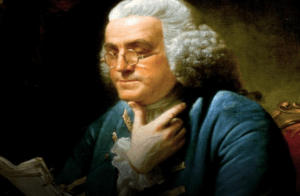Benjamin Franklin: Patriot or British Spy?
The question of whether Benjamin Franklin was a patriot or a British spy has intrigued many for centuries. Franklin is widely celebrated as a Founding Father. He helped secure French support, drafted the Declaration of Independence, and shaped the U.S. Constitution. Yet, some conspiracy theories suggest he may have secretly worked for the British Crown.
Controversial Claims of Espionage
In July 1970, Argosy magazine published an article by British historian Richard Deacon titled “Famous British Historian Claims Benjamin Franklin Was A British Spy.” Deacon argued that Franklin was listed in British intelligence files as “Agent No. 72.” According to Deacon, Franklin acted as a double agent while serving as American ambassador to France.
Deacon’s case rests on several pieces of circumstantial evidence:
- Franklin’s membership in the Hell-Fire Club, a secretive British society including figures like Sir Francis Dashwood.
- His close ties to British politicians such as Lord Hillsborough and Thomas Hutchinson.
- His longtime friendship with Edward Bancroft, who was indeed a double agent feeding secrets to Britain.
These connections suggest Franklin was deeply embedded in British social circles. Deacon speculates this may have extended into espionage.
Franklin’s Pragmatic Diplomacy
Franklin was more than just a potential spy. He was a pragmatist who valued diplomacy and moderation. His wide social network helped advance the American cause.
His charm and wit earned respect in British and French circles alike. While this raised suspicions, it also made him a skilled negotiator.
Critics Within the Revolution
Not everyone trusted Franklin completely. John Adams, his colleague in Paris, thought Franklin was too indulgent in French society. Adams wrote that Franklin was “too easy and accommodating” and warned this might weaken America’s position.
Samuel Adams, another revolutionary, distrusted Franklin’s moderate views. He feared Franklin was reluctant to push for full independence until 1775.
Relationship with George Washington
Despite doubts, Franklin shared a strong bond with George Washington. Franklin supported Washington’s early military career, admiring his leadership and calm under fire.
During the 1787 Constitutional Convention, Franklin acted as an elder statesman. He advised Washington and the other delegates. Their partnership was one of two committed leaders, not a traitor and a general.
“A Republic, If You Can Keep It”
One of Franklin’s most famous moments came at the Constitutional Convention’s close. Elizabeth Willing Powel, a prominent Philadelphia hostess, asked him: “Well, Doctor, what have we got—a republic or a monarchy?”
Franklin’s reply was memorable: “A republic, if you can keep it.”
This quote highlights Franklin’s belief in democracy’s fragility. He stressed that liberty requires ongoing effort from every citizen.
Franklin’s Role in American Independence
Franklin’s suspected espionage does not align well with his lasting contributions. His role in the 1778 Treaty of Alliance with France was crucial. His connections persuaded Louis XVI’s court to provide military and financial aid.
Franklin also confronted British abuses publicly. In 1774, at the Privy Council “Cockpit” hearing, he was humiliated for exposing letters by Thomas Hutchinson. This event did not weaken him. Instead, it radicalized Franklin and strengthened his commitment to independence.
Historians’ View on the Spy Theory
Mainstream historians find Deacon’s spy theory intriguing but unproven. Franklin’s diplomatic skill, political achievements, and loyalty to the revolution are well documented.
His success in French court politics and efforts to unite factions in Congress show a committed patriot, not a double agent.
Further Reading and Resources
- Franklin in France: The Paris Years – Library of Congress exhibit
- The Franklin Papers at Yale – Original documents and scholarly analysis
- Was Benjamin Franklin a British Spy? – Mount Vernon Digital Encyclopedia
- John Adams’ critiques of Franklin – Founders Online archives
Conclusion: A Complex Legacy
Benjamin Franklin remains an enigmatic figure. He was pragmatic, witty, and politically savvy. Rumors of espionage add intrigue but do not overshadow his monumental contributions.
His famous words to Elizabeth Powel remind us that democracy is fragile. Franklin’s legacy calls for vigilance and active citizenship.




